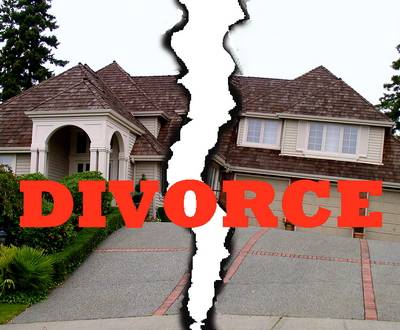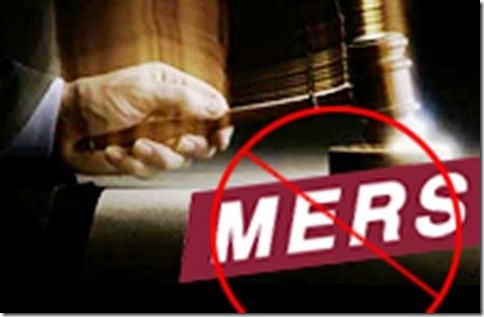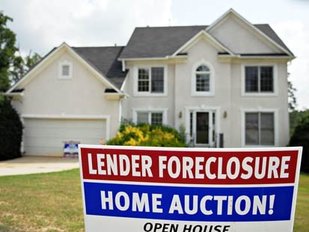
Divorce in Jacksonville, Florida is not a rare thing. According to Daily Beast, the city of Jacksonville has the ninth highest divorce rate of all cities in the United States. Many of these couples are jointly liable on home mortgages when they file for divorce. Since 46% of homes that have mortgages are underwater, many people are “left holding the bag” for mortgage payments they can’t make, refinance or otherwise settle with. Often times the only option for these people is bankruptcy. Bankruptcy and Refinancing are often the only options for debtors to have their personal liability removed from un-payable mortgage notes.
When one ex-spouse files for bankruptcy, it almost invariably causes the other to file. Of course this depends on whether or not couple had purchased a home using combined credit scores and on whether or not the non-filing individual can handle the mortgage payment on their own. If the individual is able to make the payment on their own, they may be able to refinance the mortgage, allowing for the other party to be removed from the liability on the note.
If you have questions relating to the interplay of bankruptcy and divorce, contact a Jacksonville Bankruptcy Lawyer or call us at (904) 685-1200 for a free consultation.
Articles Posted in Homestead
Fleming Island Bankruptcy Attorney: Homestead
 Although it’s rarer these days, people occasionally come into my office who have equity in their home. This is fortunate because Florida has one of the most generous homestead exemptions in the United States. There are exemptions on a federal level, but if a state chooses to create their own, residents of that state must utilize the state exemptions instead of the federal ones. Some states, like Pennsylvania, have no homestead exemption at all.
Although it’s rarer these days, people occasionally come into my office who have equity in their home. This is fortunate because Florida has one of the most generous homestead exemptions in the United States. There are exemptions on a federal level, but if a state chooses to create their own, residents of that state must utilize the state exemptions instead of the federal ones. Some states, like Pennsylvania, have no homestead exemption at all.
The Florida homestead exemption requires that the property be either: one half acre if within a municipality or one hundred and sixty contiguous acres outside a municipality. This is a unique benefit for many folks who live in Fleming island because it is largely unincorporated. What this could mean is that a person could file bankruptcy and retain a home with two million dollars in equity as exempt property and, if it’s in an unincorporated area, the property could cover several acres of land.
This exemption is outlined by the Florida Constitution, Article X, § 4. Land located within a municipality that was previously unincorporated can still be “homesteaded” as it so referred, unless the owner of the land consents to inclusion into the municipality.
Jacksonville, Florida Court Sustains Objection To Deficiency Claim
 Jacksonville, Florida Chapter 13 bankruptcy cases rarely see claims for deficiencies on real properties. A deficiency occurs when a repossessed home is sold, but the sale price isn’t high enough to meet the value of the mortgage. The different between the sale price and the amount owed is the deficiency. In Florida, the borrower owes the deficiency amount to the lender. When the borrower files for Chapter 13 bankruptcy protection, the lender almost invariably writes the debt off as a tax loss, never filing a proof of claim against the debtor.
Jacksonville, Florida Chapter 13 bankruptcy cases rarely see claims for deficiencies on real properties. A deficiency occurs when a repossessed home is sold, but the sale price isn’t high enough to meet the value of the mortgage. The different between the sale price and the amount owed is the deficiency. In Florida, the borrower owes the deficiency amount to the lender. When the borrower files for Chapter 13 bankruptcy protection, the lender almost invariably writes the debt off as a tax loss, never filing a proof of claim against the debtor.
A proof of claim is just that -evidence that money is owed by the debtor to the creditor. Creditors who wish to make a claim must do so within the proper time constraints and the claim must be valid. If the claim is not valid, the debtor or debtor’s counsel can object to the claim and have it disallowed.
A claim may be invalid for a variety of reasons. Recently, a deficiency claim for over $95,000 was filed against one of my clients. Like many people, the debtors had owned a rental property which wasn’t worth enough to cover the second mortgage. Their income was too high to qualify for Chapter 7 due to the means test, so they were forced to file a Chapter 13. The claim was unexpected, but came after the case plan had already been confirmed. In every Chapter 13 case a payment plan must be presented to all of the creditors. If the plan has not been objected to by a certain date, it is “confirmed” a term which is similar to a blessing from the court. In my case, the payment plan proposed to return the rental property back to the creditor in full satisfaction of the debt my client’s owed. I indicated that the creditor had no valid claim against my clients because the creditor did not object to the proposed plan, that because the creditor didn’t object to the confirmation of the plan that proposed to pay them no money, that creditor had lost the right to file a claim.
Jacksonville Bankruptcy Attorney Can Stop Foreclosures
 With about half of Jacksonville, Florida homes under water combined with the decrease in overall income for people across the country, it comes as no surprise that people are getting behind on their mortgage payments. Many of those people, especially those in homes that are seriously underwater, would probably benefit most from a mortgage modification or the surrender of the property altogether. However, there is a segment of the population whose home is still worth near if not more than their mortgage(s). Some of these people think that the only way to catch up on their home mortgage is to convince a bank to grant them a modification -often the kind where there are lots of penalties and fees and where the arrearages are tacked on the end of the loan as a balloon payment. These mortgages are not always available and can take so much time to achieve that the penalties become unmanageable.
With about half of Jacksonville, Florida homes under water combined with the decrease in overall income for people across the country, it comes as no surprise that people are getting behind on their mortgage payments. Many of those people, especially those in homes that are seriously underwater, would probably benefit most from a mortgage modification or the surrender of the property altogether. However, there is a segment of the population whose home is still worth near if not more than their mortgage(s). Some of these people think that the only way to catch up on their home mortgage is to convince a bank to grant them a modification -often the kind where there are lots of penalties and fees and where the arrearages are tacked on the end of the loan as a balloon payment. These mortgages are not always available and can take so much time to achieve that the penalties become unmanageable.
In many cases, filing a traditional Chapter 13 bankruptcy will help these people catch up on the arrearage on their home. This is especially helpful if there has been a recent increase in income. In a Chapter 13 we submit a plan for repayment which includes the regular monthly mortgage payment, but also amortizes the arrearage to a sixty month period to make payment more manageable. This way, if the debtor can afford it, they can catch up on their mortgage without the arduous frustration of trying to negotiate with the lender.
Filing a bankruptcy stalls any collection attempts so a case filed the morning of a foreclosure sale will cancel the sale or, if the sale occurs, will require the Judge to vacate the sale upon motion by the debtor’s counsel. As long as the debtor intends to catch up on their home mortgage and indicates the ability to do so in their bankruptcy plan, the foreclosure will end there.
MERS Under Fire by New York Bankruptcy Court
 When a bank wants to foreclose or repossess property from someone who has filed bankruptcy protection, that bank must obtain permission from the court for relief from the automatic stay provided by 11 USC §362. If the Judge enters an order granting that permission, the lender can then return to the county court and resume collection activities.
When a bank wants to foreclose or repossess property from someone who has filed bankruptcy protection, that bank must obtain permission from the court for relief from the automatic stay provided by 11 USC §362. If the Judge enters an order granting that permission, the lender can then return to the county court and resume collection activities.
Select Portfolio Servicing (SPS) sought to foreclose on a mortgage held in trust by First Franklin Mortgage Loan Trust which encumbered a property possessed by a debtor in Chapter 7. SPS filed a motion for relief from automatic stay and the debtor objected on the grounds that the Mortgage Electronic Registration System (MERS) could not establish that it held an enforceable right against the property as MERS had no valid and enforceable interest in the mortgage.
States have various recording requirements for secured loans. One of the most common terms is “Perfection”. A lien must be “Perfected” for it to attach to the subject property. “Perfection” is synonymous with “Recorded with the County (or state)”. If a lien is not properly recorded, the lien does not attach to the property and is as unsecured as a credit card, i.e. you don’t pay your mortgage and the lender can’t take the homestead.
Mortgage Modifications through Mediation and Bankruptcy
 Nearly half of Florida homes that have mortgages are worth less than the mortgage debt on the home. This, combined with the nation-wide decrease in incomes has lead to one of the greatest recessions our country has seen.
Nearly half of Florida homes that have mortgages are worth less than the mortgage debt on the home. This, combined with the nation-wide decrease in incomes has lead to one of the greatest recessions our country has seen.
A home mortgage is essentially a contract. You promise to make payments according to the contract’s terms, and the lender promises to transfer the home’s title to you when you finish making your payments. The government regulates these contracts by creating laws that set out procedures for things like foreclosures. Of course, there is still an element of free contract which allows lenders and borrowers to negotiate the terms of their agreement at any time. The government is limited in how much they are allowed to interfere with contracts so instead of trying to force banks to offer mortgage modifications, they make programs like HAMP, which offers lenders tax deductions or other benefits to make deals with borrowers. Personally, I think that the government isn’t offering the lenders enough in benefits because banks aren’t particularly helpful in getting borrowers into the program. HAMP mods are done in-house by the banks and “can” lower a borrowers mortgage payments to 31% of their gross income if you qualify. But what if you don’t qualify, and what if your payments are already below 31% of your gross income?
This is where lenders will begin the foreclosure process. They may offer you a so called, “in house modification”, but offer or no, the foreclosure process will continue until either you are somehow successful in obtaining an in-house modification or your home is sold on the courthouse steps. This is because the judiciary can’t force a bank to modify your loan. Honestly negotiated terms that were created in accordance with the laws can’t usually be modified by the government due to our rights to free contract as citizens. That being said, a recent program out of Orlando creates an opportunity for people facing Jacksonville bankruptcies and foreclosures.
Jacksonville Bankruptcy still linked to Underwater Homes
 Although bankruptcy filing rates are down, the primary cause for most bankruptcies at my office is underwater home mortgages and the inability to pay those mortgages.
Although bankruptcy filing rates are down, the primary cause for most bankruptcies at my office is underwater home mortgages and the inability to pay those mortgages.
When someone applies for a mortgage, the bank (or mortgage broker) uses a variety of tools to determine the amount of money the applicant can borrow -and for how long. Of course, one of the factors that weighs heaviest is the borrower’s ability to repay the loan. Although interest rates have varied greatly over the years, the term length of mortgages has generally increased. For instance, mortgages are usually thought to last thirty years, but now I have seen forty year mortgages and have even heard of fifty year mortgages.
Since the average age of a first-time homeowner is 34, a forty year mortgage would leave the buyer at 74 by the time they paid off their house. According to the CIA, the average American lives to be a little more than 78 years. This means that people (often couples) work almost their entire lives to pay off their homes.
Co-Debtor Stay in Chapter 13 Bankruptcy
 When someone files for bankruptcy an automatic stay is put into place. The stay prevents creditors from making any collection attempts (calling, repossessing, selling) prior to obtaining court permission or, prior to the dismissal of the bankruptcy case.
When someone files for bankruptcy an automatic stay is put into place. The stay prevents creditors from making any collection attempts (calling, repossessing, selling) prior to obtaining court permission or, prior to the dismissal of the bankruptcy case.
A Co-Debtor Stay created by 11 USC §1301 occurs when the person filing bankruptcy owed a debt jointly with a non-filing person, typically a spouse. By virtue of being a co-debtor, creditors may no longer make collection attempts against the non-filing person as well. This becomes particularly useful when the creditor has a security interest, such as in a home. For example, if a couple was behind on a jointly owned homestead but one spouse individually owed a large amount of credit card debt, that one spouse could file a Chapter 13 bankruptcy, catch up on the mortgage arrears and simultaneously discharge their unsecured debts. While that spouse was in bankruptcy, the bank could not foreclose on the home as to the non-filing spouse because of the automatic stay protection.
Unfortunately, the Co-Debtor stay does not go into effect as to business assets or function in Chapters 7 or 11, so a conversion from a Chapter 13 to a Chapter 7 would cause problems.
Home Values Slide for All Kinds
 The average American isn’t the only one facing the effects of a sunken housing market as recent sales show that even very wealthy celebrities have failed to sell their homes for near their asking price. Regis Philbin recently sold his Greenwich, Connecticut home for $3 million dollars. This may not seem like a hardship, but it’s a far cry from the original $5.9 million he started at in 2008. Regardless of the price, taking three years to sell and having to drop the price by nearly half is not a good economic sign.
The average American isn’t the only one facing the effects of a sunken housing market as recent sales show that even very wealthy celebrities have failed to sell their homes for near their asking price. Regis Philbin recently sold his Greenwich, Connecticut home for $3 million dollars. This may not seem like a hardship, but it’s a far cry from the original $5.9 million he started at in 2008. Regardless of the price, taking three years to sell and having to drop the price by nearly half is not a good economic sign.
Mel Gibson is having similar problems selling his Greenwich home, but he is also facing a divorce- putting the actor on a tighter time line to sell. Mr. Gibson first listed him home for $38.5 million, but the price has dropped by nearly $10 million since then and it still hasn’t sold.
Neither of these celebrity home sale losses are as great in percentage as Beyonce‘s recent sale of a condo she’d purchased for $465,000 but sold for $110,000.
Mortgage Debt Relief Act of 2007 set to expire
 The Mortgage Debt Relief Act of 2007 was enacted as a response to the growing foreclosure problem. More specifically, it addresses the issue of “Debt Forgiveness Income.” Debt Forgiveness Income is an IRS theory that if a debt you owe is forgiven, you have gained in monetary value because you no longer are required to pay that debt. That gain in value is taxable as income despite the fact that you didn’t actually earn any money. For example: Stephen owes $5,000 in old medical bills. He can’t pay the bills, so the hospital forgives the debt and writes it off on their taxes. Come tax time, he will receive a Form 1099 for $5,000 of additional, previously untaxed, income for that year. Now, $5,000 may not be too much of a problem, even in the highest tax bracket this would only increase his taxes by $1,750, the trouble starts when the amount forgiven is higher, as it is with a house.
The Mortgage Debt Relief Act of 2007 was enacted as a response to the growing foreclosure problem. More specifically, it addresses the issue of “Debt Forgiveness Income.” Debt Forgiveness Income is an IRS theory that if a debt you owe is forgiven, you have gained in monetary value because you no longer are required to pay that debt. That gain in value is taxable as income despite the fact that you didn’t actually earn any money. For example: Stephen owes $5,000 in old medical bills. He can’t pay the bills, so the hospital forgives the debt and writes it off on their taxes. Come tax time, he will receive a Form 1099 for $5,000 of additional, previously untaxed, income for that year. Now, $5,000 may not be too much of a problem, even in the highest tax bracket this would only increase his taxes by $1,750, the trouble starts when the amount forgiven is higher, as it is with a house.
If Stephen’s home is foreclosed upon and the bank forgives a $50,000 debt, he will owe taxes for his actual annual income, plus this $50,000. You could’ve argued that $5,000 wouldn’t effect what bracket he was in before, but $50,000 is almost certain to increase his tax bracket and will leave him with a minimum of $12,500 in additional tax debt. As a result, Stephen may be in debt for a long time. If he didn’t have the money to pay his mortgage, it doesn’t make sense that he’d have enough money to pay the taxes.
It was because of Stephen’s scenario that the Mortgage Debt Relief Act of 2007 was passed. The act allows a person whose homestead has been foreclosed on to have his debt forgiveness income waived so long as it is less than a million dollars per year.
 Jacksonville Bankruptcy Lawyer Blog
Jacksonville Bankruptcy Lawyer Blog


